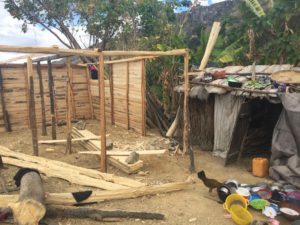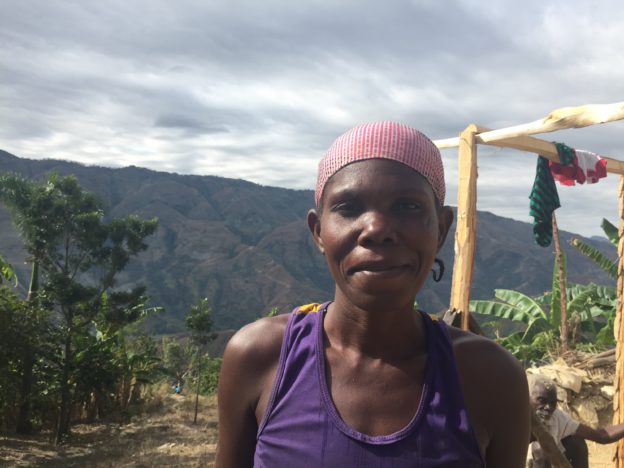“Jan bagay yo te ye, yo komanse chanje. Mwen gen twalèt. Mwen chanje bèt.” Solène is anxious to talk with me as soon as I appear. “Things aren’t the way they were. I have a latrine. I have livestock I take care of.” She lives on a little hill, just 15-20 feet about the land that surrounds it. The hill has enough room for her own house, but not much else.
The house her mother-in-law gave her, which she was living in when she joined the program, is gone now. She had it torn down. She needed the better pieces of lumber she could scavenge from it and the space it was on for her new home. Right now, she lives with her husband and children in a temporary shack they threw together of straws walls and a roof made of palm seedpods.

Work on the house is moving along. “They told us from the beginning that they’d help us build a new home, so we started getting ready.” She continues by citing a Haitian proverb discussed at her training. “Se avan dòmi nan jè w, w ranje kabann nan.” That means, “You make your bed before you get sleepy.”
Building a new home is costing a lot of money, however. She can’t use the livestock that she received from CLM. Neither her goats nor her pig have produced anything that she can sell yet. So she depends mostly on careful management of her weekly cash stipend and the 50 gourds her husband can earn most days by working in neighbors’ fields. That’s less than a dollar. They have a third source of income, their plantains. They can harvest some to feed the children and some to sell so that they can buy the things they need.
That garden points to their continued fragility. It was planted on rented land, and Solène can already see that she and her husband won’t be able to take the plot for another year. The money they are investing in their home leaves them with nothing to pay the rent with.
But Solène remains optimistic, and she points to the program’s role in her optimism. “I’m on my way. I never had money or a plan for how to spend it. The program pushes you to move yourself forward.”
